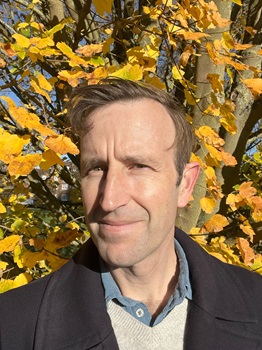Prof Robert Macfarlane, Emmanuel

Biographical Information
Robert Macfarlane is Professor of Literature and the Environmental Humanities at the Faculty of English in Cambridge. He is well-known as a writer about nature, climate, landscape, people and place, and his books –– which include Underland (2019), a book-length prose-poem Ness (2018), Landmarks (2015), The Old Ways (2012) and Mountains of the Mind (2003) –– have been translated into more than thirty languages, won prizes around the world, and been widely adapted for music, film, television, radio and theatre.
He has also written operas, plays, and films including River (2022) and Mountain (2017), both narrated by Willem Dafoe. He has collaborated closely with artists including Olafur Eliasson and Stanley Donwood, and with the artist Jackie Morris he co-created the internationally bestselling books of nature-poetry and art, The Lost Words (2017) and The Lost Spells (2020). As a lyricist, he has written songs and albums with musicians including Cosmo Sheldrake, Karine Polwart and Johnny Flynn, with whom he has released two albums, Lost In The Cedar Wood (2021) and The Moon Also Rises (2023) and an EP, Six Signs (2022). In 2022, with the actor-director Simon McBurney he co-adapted Susan Cooper's classic fantasy novel The Dark Is Rising into a twelve-part BBC audio drama series.
He is a Fellow of Emmanuel College and of the Royal Society of Literature. In 2017 the American Academy of Arts and Letters awarded him the EM Forster Prize for Literature, and in 2023 in Toronto he was awarded the inaugural Weston International Award for career achievement in non-fiction. His current book project, forthcoming in early 2025, is entitled Is a River Alive? and concerns the lives and deaths of rivers and the global Rights of Nature movement.
Research Interests
The environmental humanities; geology; deep time; subterranea; walking; new materialisms; the Anthropocene; apocalypse cultures; dwelling; ruins; land-ownership; technology and virtualisation; phenomenology; psychogeography; ideas of nature and wildness; travel-, nature- and place-writing; creaturely life; ethics and literature; cities; public/private space; radical landscape poetry; originality and intertextuality; gift.
Areas of Graduate Supervision
As per research interests. He convenes an MPhil course on the 'Cultures of the Anthropocene'. The subjects of recent PhD students have included 'compromised landscapes' and experimental British poetics; constellational form and ethics in Proust, Sebald and Teju Cole; site specificity and contemporary sculptural poetics; 'counterfeit culture' and post-war American fiction; ethics and mysticism in post-war fiction; the Scott/Terra Nova expedition 1910–1913; ‘hyperspace’ in American short fiction 1960–1980; the British overseas travelogue 1900-1942.

